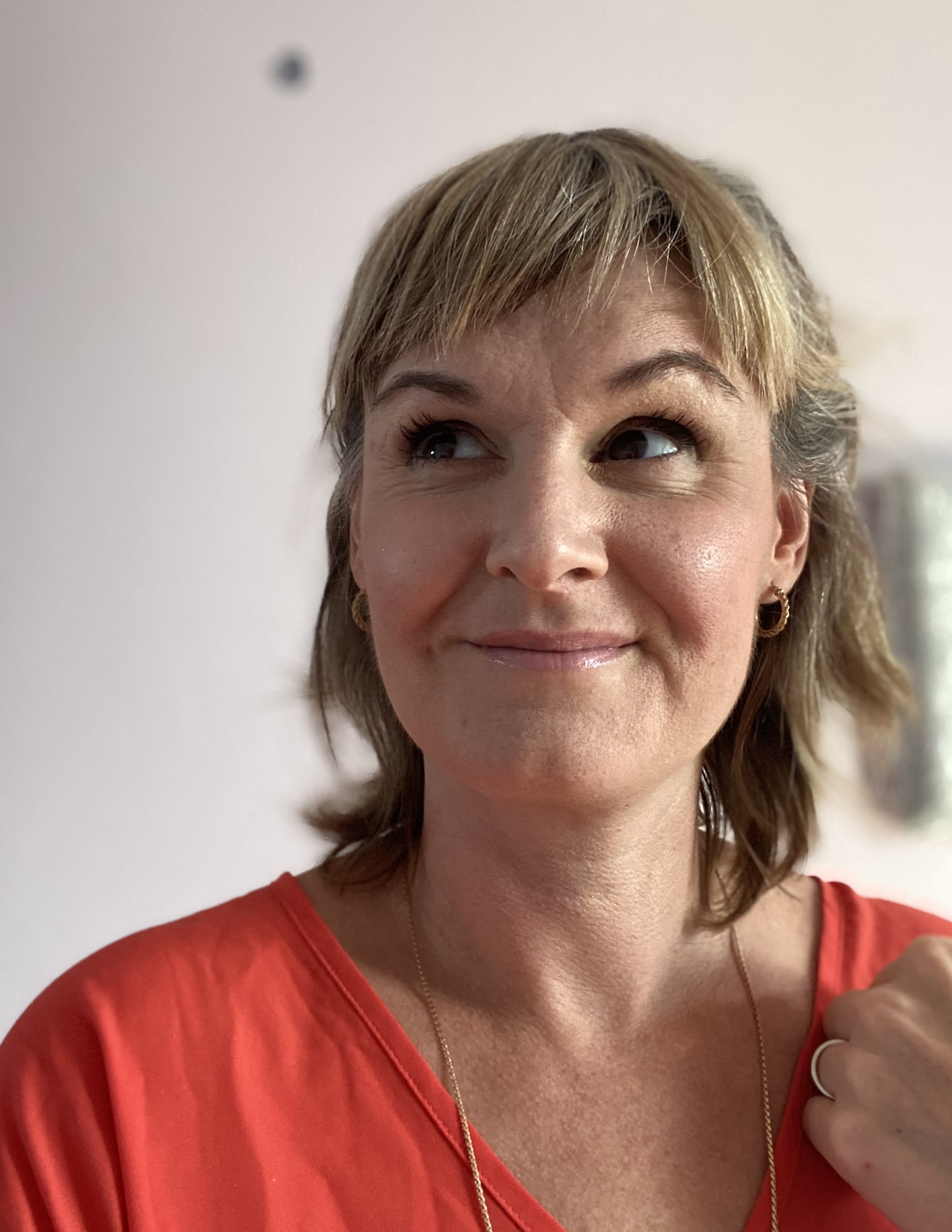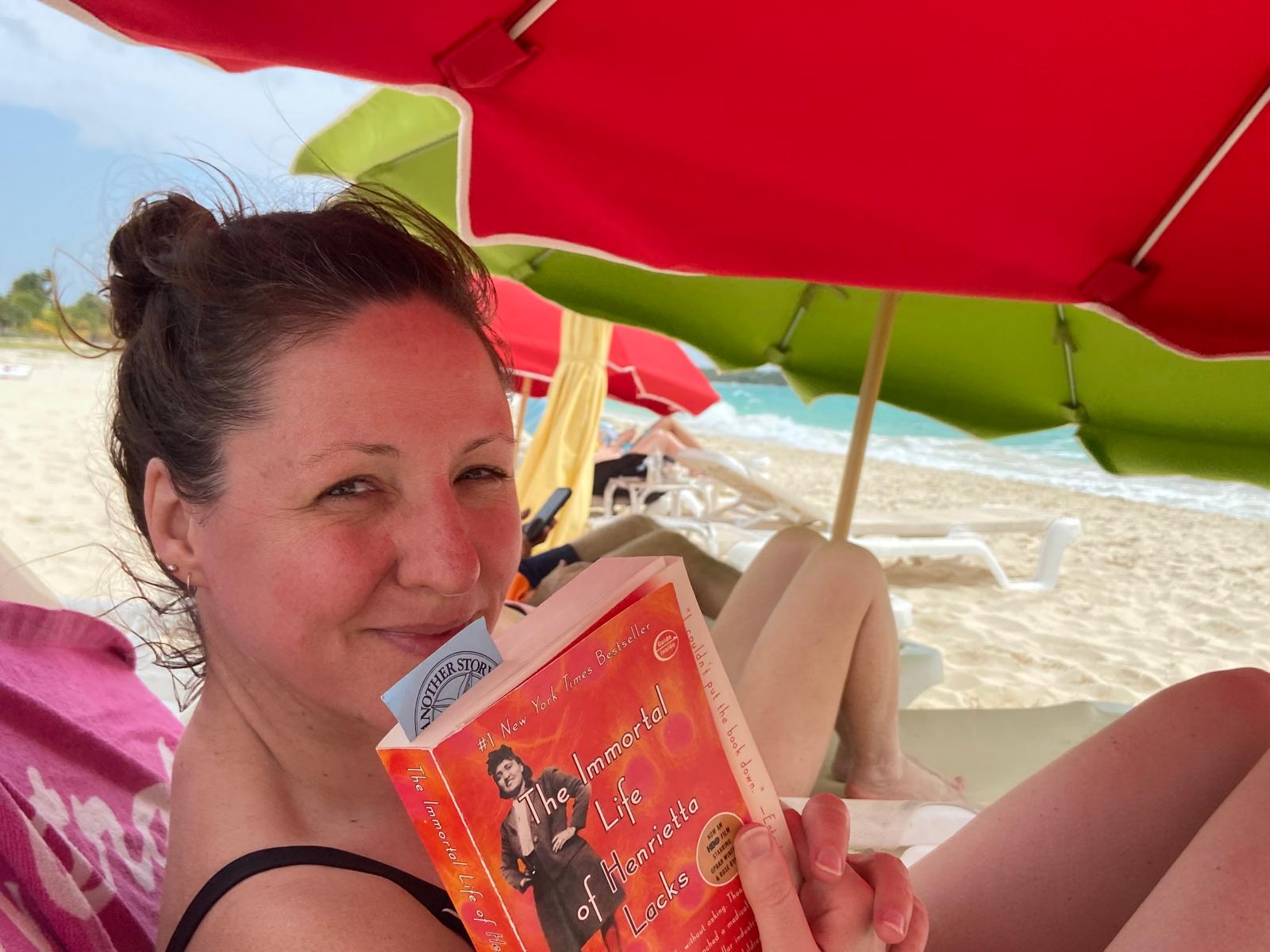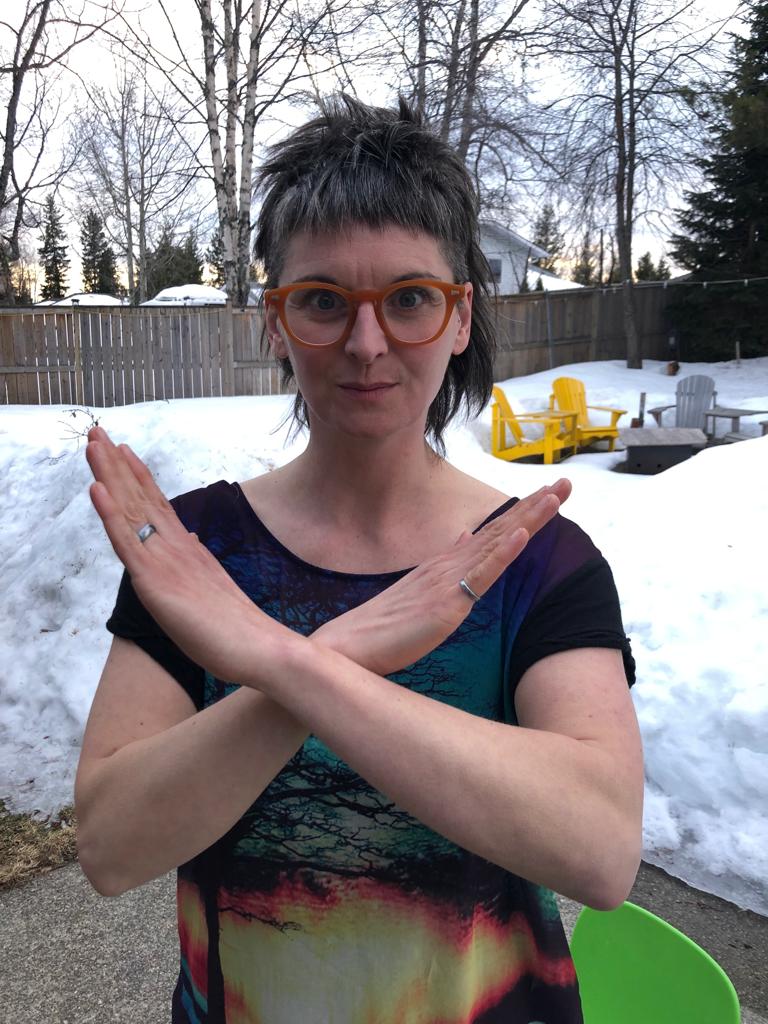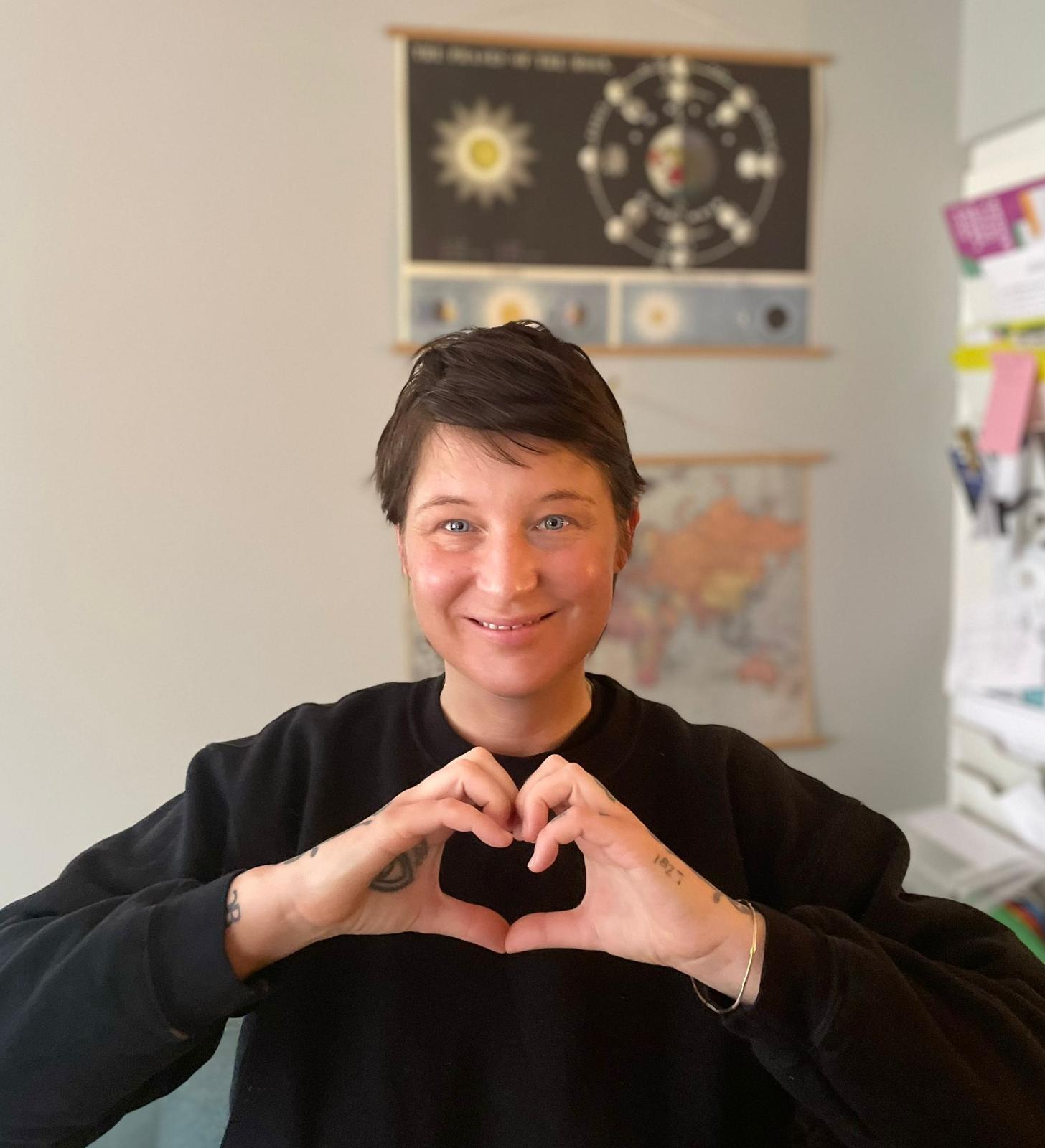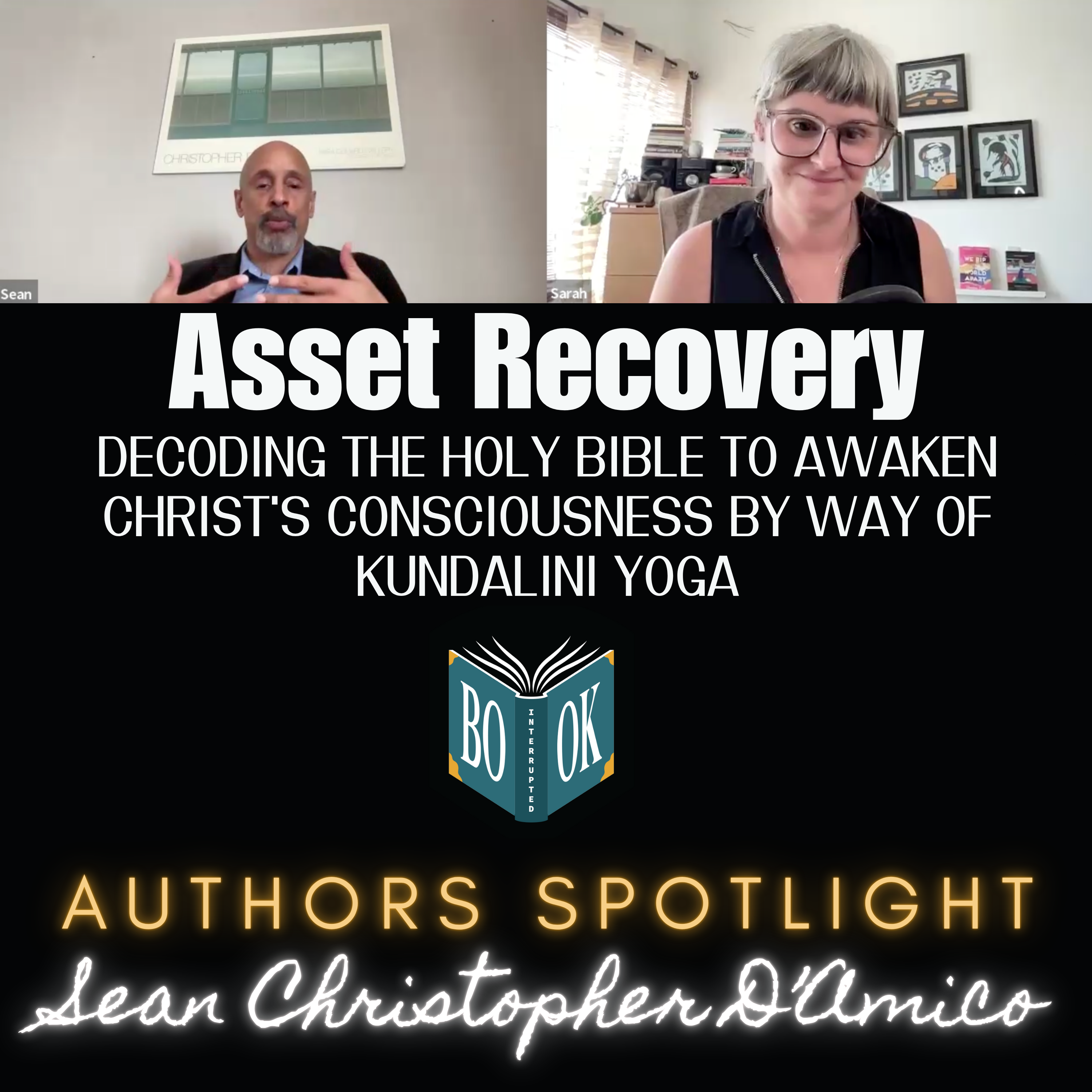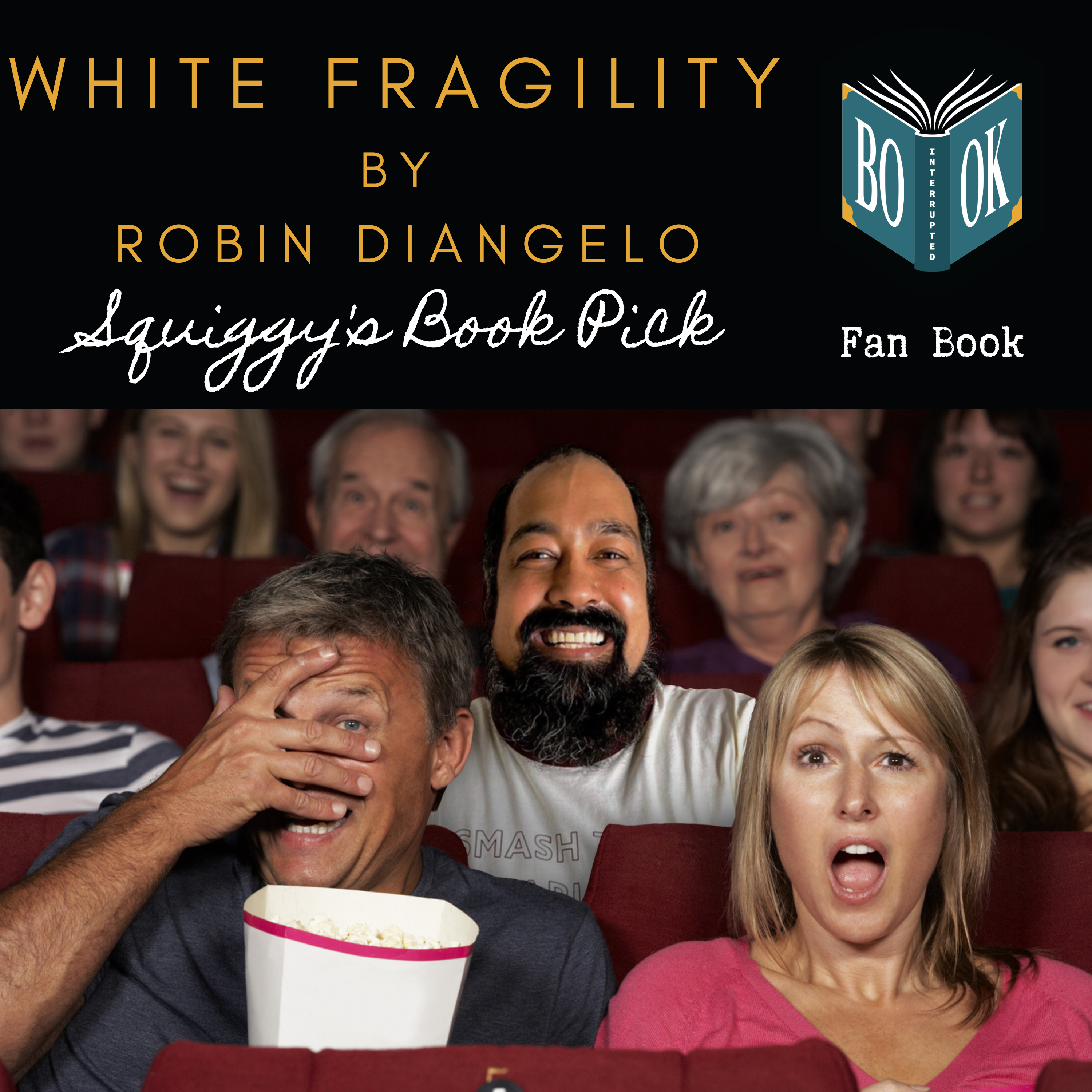Episode Transcript
[00:00:00] Speaker A: You've thought about joining a book club, but there's one you're too busy or buying books aren't in your budget, or some books aren't in the format that you can access or you lose interest before you can finish. Or maybe you have no interest in reading the book. Whatever the reason, there is a book club for that here at Book Interrupted. Reading the book is not a prerequisite for joining the conversation. It's about connecting and celebrating life's interruptions. Join the community by following us on Facebook or contact us through our website at www.bookinterrupted.com.
fans, we'd love to hear from you. Parental guidance is recommended because this episode has mature topics and strong language.
Here are some moments you can look forward to during this episode of Book Interrupted.
[00:00:51] Speaker B: So in Kundalini Yoga, we have a posture called the ego eradicator where you hold your arms up at 60 degrees and you're creating that inverted triangle. So we're practicing what's called sacred geometry.
[00:01:01] Speaker C: I think there is so much depth in different religious scriptures that most people don't interact with.
[00:01:09] Speaker B: The old guard is doing a lot of work on maintaining control of how information is disseminated them.
[00:01:16] Speaker C: Being asleep is key for the peaceful time that I need, but I love that it's a divinely supported time.
[00:01:25] Speaker B: You will start to develop that relationship between yourself and the universe around and within you by simply going in within yourself.
[00:01:32] Speaker C: I think that happens in all religions. I think that there are some that I want to say more spiritually based and some are more structured, control based.
[00:01:42] Speaker B: But you don't know the meaning of what all these stars and their alignments have to do. So you're stumbling forward with a lack of that knowledge. He said if you don't look at the Bible within a scientific framework, you're missing out on the meaning.
[00:02:02] Speaker D: To read a book is the goal.
I want to learn something new.
I don't want to be disrupted.
Mind, body, soul, inspiration is the goal and we're gonna talk it out on book on Book Interrupted.
[00:02:31] Speaker A: Welcome to the author's spotlight. During these mini episodes, we have authors come on and tell us about their books and why we should read them. Let's listen.
[00:02:40] Speaker C: Welcome to the Authors Spotlight.
[00:02:42] Speaker A: On this episode, we're interviewing Shawn d' Amico and his book Asset Recovery. Decoding the Holy Bible to Awaken Christ Consciousness by Way of Kundalini Yoga. Hi Sean.
[00:02:54] Speaker C: Thanks for being on the show.
[00:02:56] Speaker B: Hi Sarah. Thank you for having me.
[00:02:58] Speaker C: So, Sean, why don't you let us know why we should read your book?
[00:03:02] Speaker B: That's a great question. Essentially, during my experience as a Kundalini Yoga practitioner, I started doing a lot of research into various things. And I was an atheist for many years of my life. I became very passionate about what are called pyramids, the ancient origin of pyramids. And that led me to the work of an Austrian hydrologist named Victor Schauberger. And Schauberger would sit in the vast expanses of the Austrian wilderness during the pre industrialized encroachment of civilization.
So he deduced that energy is the cause, form is the effect. So the physical world that we're living in comes from a higher energetic process. And so this was all very intriguing. And so I was reading this book called Living Energies by Callum Coates. And Callum Coates studied Victor Schauberger's work. He said that, you know, everything's in a certain vibration, including consciousness. And for humans to realize their totality, to start practicing Kundalini Yoga. And so as I was practicing Kundalini Yoga, the whole concept of the divine and God started. It was part of the process. It's a spiritual practice. And so God was a word that was used quite often. And I, coming from an atheist background, felt quite, you know, challenged by it. But I also understood from that book, Living Energies, that there's a lot of things that are happening in our universe that we're not really completely aware of. And so as I grew in my yoga practice, I revisited Richard Dawkins. I don't know if you know of Richard Dawkins, but he's a staunch atheist. I actually have some of his books from the 90s when I was following him. One was called the Blind Watchmaker. And he wrote a book in 2004 or 2006 called the God Delusion. And so as I was reading the God Delusion, I had a different perspective, and I found the book very confrontational because his perception of the divine was. Was through the Bible, and it was through a literal interpretation of Scripture. And what I realized as I started researching and looking into the Bible, that most people, including atheists and Christians, have an experience with the Bible through a literal interpretation or a literal lens. I found someone online who had a church in the 90s. He passed away, but he had a YouTube channel, and he was offering sermons that were examining scripture within an allegorical framework. So he was looking at the Bible within a symbolic language. I picked up the Bible, I started reading it, and then I started examining it through that allegorical lens. And then I realized there's several layers to this book. And even in Judaism, they have a system called pardes, and their first interpretation is the literal, but the fourth is what's called the Kabbalah, or the mystical aspect of it.
So even in Judaism, they have these tears. And so as I started exploring the Holy Bible within the allegorical framework, I started realizing that there's a lot of stuff that's being left on the table because most people don't understand what they're reading and they're walking away, or they're rejecting it from that literal interpretation, or they're interpreting it from a literal interpretation, and they're missing the meaning entirely. And so the nature of my book was to go in and really pull out the key pillars and present them in a way that's plausible. For instance, one of the ancient biblical scholars, Maimonides, who was a Hebrew, he said, if you don't look at the Bible within a scientific framework, you're missing out on the meaning. So science really has to be integrated within that interpretation in order to extract a greater value and meaning from what's being conveyed in these stories.
[00:06:26] Speaker C: No, I completely agree. I think that it's kind of a. Not a downfall, but kind of a downfall of a lot of religion or followers of religions. I'm Muslim, but I think a lot of times people read the stories and take them literally instead of trying to look for the spiritual meaning of that message. I agree with you completely. I think there is so much depth in different religious scriptures that most people don't interact with.
[00:07:00] Speaker B: Absolutely. And I had a neighbor when I was living in Montreal, and I would spend time at the park. I would be doing my research and my writing and things of that nature, compiling information.
And one point, I was across the street sitting on a bench, and my neighbor was a staunch born again. He would not let his wife sleep in his bed if she was having her monthly cycle. That's how extreme he was. Right. And I mean, whatever. That's the thing. But that's. It exists. You know it exists.
[00:07:28] Speaker C: No, I know.
[00:07:30] Speaker B: It's just. Anyway, yes, so he sat down. He used to call me the yogi, because I had my studio just up around the corner from where I was living, and he was the superintendent for the building next to mine. And so once he understood what I was working on, he became extremely defensive. You know, there was months where we didn't speak anymore because of. He was so confronted by what I was doing because I was not an authority in his eyes, to have launched such an inquiry. You know, only the Priest or the pastor has the authority to interpret. So that's kind of where I've experienced a lot of resistance from people who are other Christians, not necessarily as extreme as him, or who are atheists, who just have blinders on and refuse to listen. And I've presented, you know, interesting examples. For instance, it says, well, what is God? God is light. So the book is telling us that it's about the science of light. And what I've understood, like even right now, where in your part of the world, it's not as, as extreme. But in Canada we have daylight, but the angle of the sun is so low that it can't sustain life. So everything's based on angles. Light is really a function of angles. Now the sun has begin, began its ascent on 25 December, it begins ascent in the horizon. And then it reaches a point where the angle is high enough that life can start to flourish again. And that's when spring comes. So angles are extremely important.
The Bible tells us God is light. That's one of the things that we can actually interpret on a literal basis because it's really about the science of light and how that light can impact ourselves. For instance, it also says in the beginning was the Word, the Word was with God and the Word was made flesh. So if the Word is God and God is light, then the Word is light as well. And if the Word was made flesh, then the flesh is also light. So one of the interesting things is photosynthesis. So the New Testament and the translators of the Bible were Greek speaking Hebrews. So there's a lot of Greek mythology embedded within the text. And there's a lot of anatomy within the text as well. But photo is light. In Greek, photosynthesis means processed light. When there's photosynthesis, when there's plants, the green leaves, they take light and they transform that light into oxygen. So when we're breathing, we are inhaling transformed oxygen. So in the law of thermodynamics, energy isn't destroyed, it's just reimaged or repurposed. The air that we're breathing is processed light. The plants also produce what's called ATP, adenosine triphosphate. Now, ATP is energetic currency. You cannot move anything within your body without ATP. It's a primary messenger. Our bodies are forms and function of light. We inhale light, so we thrive off of light. In Kundalini yoga, that's called prana. And the first unit of energy is the air that we breathe. We can also get energy from the food, the Third aspect of our energy source is from sleep, but our movements are all founded upon what's called ATP or adenosine triphosphate. And that, of course, is produced through photosynthesis. The entire makeup of our world is really based on light. You know, from that scientific perspective, when you start to introduce that into your interpretations of Scripture, you know, it expands the view and it gives you a better understanding of what you're reading. And so that's kind of like a fundamental foundation I've used in terms of presenting the book and the stories that I've come across.
[00:10:51] Speaker C: I have two questions. The first question is, within the book, does it incorporate the yoga within the book, or is it taking your lens from Kalini yoga and putting it on specific pillars within the Bible?
[00:11:08] Speaker B: That's a great question. It's a bit of both.
So I feel that because of my experience with Kundalini Yoga, it's allowed me to interpret what I'm reading through that framework and realize that the book itself is really talking about yoga and meditation. For example, Kundalini Yoga is a yoga of angles and triangles. So part of my interpretation of Scripture has to do with examining a lot of the words that we're looking at and realizing that there's synonyms to those words.
For instance, if I say Noah was perfect in his generations, that would probably imply that it has to do with his genealogical lineage. But generations is a synonym for geometry. So we could also say Noah was perfect in his geometry. What does that mean? Well, it means that he was positioning his body in these specific geometrical shapes. For instance, the star of David is inverted triangle. Well, there are two triangles that emerge. One is pointing downwards, one's pointing upwards, but they're all equilateral triangles. And all the ratios of those triangles, all the angles are 60 degrees. So in Kundalini Yoga, we have a posture called the ego eradicator, where you hold your arms up at 60 degrees and you're creating that inverted triangle. So we're practicing what's called sacred geometry. The word angle originates from the word angel. So whenever you're hearing the word angel in scripture, it's really referring to angles, because angels are messengers of God, and in quantum science, photons are messenger particles. We're having a correlation between quantum science and scriptural language. God is light. Angels are his messengers that transmit information, but also are used to receive. The word angle comes from the word angel. Light is very dependent upon angle. We have what is called scattered light. So if you put on glasses that have polarized lenses, what it does is it takes that light and brings it onto a single plane so it reduces the scatter.
So when you bring your body into a certain angular alignment, which we practice in yoga, we tap into these angelic frequencies. The experience I have with yoga has really helped me expand or interpret what I'm reading from the book. The Kundalini energy is a three and a half spiral. So it starts at the base of the spine, it threads through the navel, through the heart, through the throat and out through the top of the head. So it's a three and a half spiral. And that three and a half spiral comes up in scripture on numerous occasions. So the Kundalini energy itself is in the Bible, which was very profound for me because I had read within Kundalini Yoga that many traditions stem from this practice in Islam. The Sufis, we have a practice in Kundalini Yoga called the Sufi grind. The Sufis are the mystical branch of Islam. They do a lot of things that are contrary to what the reserved Muslims practice. And in fact, I worked at a call center for many years and I worked with a lot of Muslims. And one person who's Muslim and he referred to the Sufis as devil worshippers.
Yeah, yeah. I mean, you know, that's his view, that's what he grew up with. But I mean, from what I understand, like I took a course, a religious literacy course, Harvard Edex. We looked at the different sects within Islam. And in Pakistan, apparently they don't allow music to be played on the radio. Things that is very extreme. And I think they practice the Sharia law and whereas the Sufis are all about singing and dancing and stuff. So they're complete opposites.
[00:14:33] Speaker C: Yeah, I think that happens in all religions. I think that there are some that, I wouldn't say more spiritually based and some are more structured, control based, in my opinion.
I was going to ask you about sacred geometry, so you went into it anyway. And quantum science and quantum physics. So it said here astronomy, astrology, numerology, even. One of our, our hosts is Christian, but she's very. I don't like saying New Age, but she's very spiritual and she knows all about all of these other modalities as well and intertwines them into her beliefs. So it makes me think this book, that's the reader and listener that this book would really speak to is someone that identifies as Christian but also practices this form of meditation and spirituality and astrology and sacred geometry and all of them. How they would really enjoy. How you've pointed out things within their own religion. Also, I think sometimes it can alienate.
[00:15:37] Speaker A: Someone within their religion when they have.
[00:15:39] Speaker C: Within their heart, have these other beliefs, spiritual beliefs and spiritual practices, but might not have the words or the knowledge to say no. It's all the same.
It's all connected. So I like that.
[00:15:56] Speaker B: Thank you. Absolutely. As someone who has some experience with spirituality, with astronomy or astrology, especially astrology, I really never grew up in a Bible household. I was an atheist for many years of my life. I mean, I was baptized Catholic and I was at a church when there was a wedding or a funeral. But if I had a Jehovah Witness knock at my door or call on the phone, you know, I'd hang up or I'd slam the door, and I wanted nothing to do with it. So, for sure, I believe that your friend would get something out of this book. Because a lot of Bible study, they refuse to look at the astrological aspect of the book. And it says in Genesis, let them be for signs. So it speaks of signs as the zodiac signs. My father's house has many mansions. So houses are representative of the 12 houses of the zodiac, and the mansions are the lunar zodiac. So the book itself exudes astrology, but there's a Christian blind spot, and they refuse to go into that aspect of it. You know, Jesus spoke in parables, parables as a synonym for allegory. He said, you know, you can tell if it's going to snow outside, but you don't know the meaning of what all these stars and their alignments have to do. So you're stumbling forward with a lack of that knowledge.
[00:17:05] Speaker C: Yeah, well, the ancient world really understood that, and I think it's been a bit lost. Be honest. I'm very much into astrology as well, actually, all of this stuff.
[00:17:17] Speaker B: So I think you would definitely like that. Because Kundalini Yoga, we are referred to as Aquarian teachers, and this is the Aquarian age. So we've transitioned from the Pisan into the Aquarian age.
And there's a verse in scripture, and I'm just. Sometimes I'm drawing a blank here, but it says, look for the man bearing a pitcher of water. So if you look at the astrology, the Aquarian star chart, it's a man bearing a pitcher of water.
[00:17:43] Speaker C: Yeah, he's the water bearer.
[00:17:44] Speaker B: Yeah, that's it.
The Holy Bible was compiled 2,000 years ago, was written for us in this time frame. It was prophesied for us as we are entering this time frame. And in terms of the Piscean age. Thoughts will be thought for you. You won't need to think, the system will think for you. Your thoughts will be given to you. But now that whole apparatus is starting to be shed and now people are learning to think for themselves and there's a massive effort to decentralize information.
Whereas if you. In the 70s and 80s and the 90s, if you wanted news, you had to go and listen to Dan Rather or Tom Brokaw and the news came to you at 6:00 at night. But now you have all these platforms providing all sorts of information. Now there's still a level of filtering that's going on. And we saw during the pandemic there was censorship that was going on. So there's still. The old guard is doing a lot of work on maintaining control of how information is disseminated. But those systems are archaic and they're starting to break down and people are starting to find answers themselves. And even if they don't find the answers to the system. Putting your arms up at 90 degrees or sitting in meditation, you're starting to download because this is cosmic law that we're practicing, this is sacred geometry. And you will start to develop that relationship between yourself and the universe around and within you by simply going in within yourself.
[00:19:01] Speaker C: I love that. I love that a lot. I do yoga with the sun coming up. I do sunrise yoga because my kids leave early in the morning. So between my oldest daughter leaving and my other ones waking up, I go outside and do sunrise yoga. And yeah, you just feel. You can feel connected. You actually feel connected to the universe, your soul, energy, everywhere.
[00:19:24] Speaker B: Yeah, that's a perfect time. So in. In our tradition and it actually. There's a great documentary called the Keepers. It's about the Catholic nuns. And there was a nun that disappeared in the Baltimore area. And so as she was going through her training to become a nun, they would wake up at five in the morning to meditate. Never did I ever know that there was meditation within the Catholic tradition. And they did it first thing in the morning.
[00:19:48] Speaker C: Wow.
[00:19:48] Speaker B: In our Kundalini tradition and in many yoga traditions, it's called the ambrosial hours. Waking up between 4am and 8am is referred to as the ambrosial hours because everything's very calm. And so it's like you go to the beach, you get that wave is you're riding a wave and energy, that of that day and that time that you take to spend with yourself just carries you forward. It's a very intuitive thing to get up at that time. Of morning and meditate.
[00:20:11] Speaker C: Wow. Yeah. So what I usually do is I meditate before I wake my daughter up and then I get my one daughter ready and then I do the sunrise yoga and get my other kids up. But I'm glad it's the perfect time. I chose it because my kid, I have three children, so them being asleep is key for the peaceful time that I need. But I love that it's a divinely supported time. I feel that it is like, I can tell that it was, but it's nice that you're backing that up with.
[00:20:42] Speaker B: Even in the Old Testament, Jacob wrestled with a man. Man in Sanskrit is mine. But later in one of the later verses or chapters, it says that the man that he wrestled with was an angel. So not only was he wrestling with his own mind, but he was also involved in some type of angel or angelic posturing. So he was doing yoga and meditation in the morning. And so at that point he defeats the man or the angel, he has success, and then he transitions into a place called Peniel. Peniel as a phonetic variant of pineal. So he activated his pineal gland and then he has a face to face experience with the divine as the sun rises over him. So it's a very profound experience.
And in Kundalini yoga, knowledge becomes wisdom through experience. We have to do that work. And you're intuitively timing tuned in to doing that work at that time in the morning. Yeah, it's fantastic.
[00:21:31] Speaker C: That's great. I love that. That is actually all the time we have for our episode.
[00:21:36] Speaker A: Any last words that you want to share with any of our listeners before we go?
[00:21:41] Speaker B: You know, I have my mind blown having read my book. I had to read it several times to massage it and flesh it out. And I had a friend of mine who's part of the Kundalini community and he was a editor for HarperCollins. So it was a really great thing for me to have met him. He proofread the book and of course I went through his suggested edits. But every time I read the book, I blow my own mind away by what I'm learned and what I've shared. It's a hefty book. It's 400. It was 600 and some odd pages. I kind of whittled it down to maybe 427, I think I try to use big pillars or big rocks. So stories that most people can relate to. Many people haven't read the Bible of the Holy Bible, but I did my best to share stories that most people may have come across like Jacob's ladder or Moses parting the seas or Jonah being swallowed by the royal, you know, things of that nature. Most people have heard of those stories, you know, if they haven't actually read the book itself. So I've done my best to simplify it as much as possible and conveyed in a way that I think it's a real tool in order to understand scripture from a non literal perspective and how to apply that knowledge.
[00:22:55] Speaker C: That's so great.
[00:22:56] Speaker A: Okay, listeners, if you'd like to pick.
[00:22:58] Speaker C: Up Sean's book, you can go to.
[00:23:00] Speaker A: The Book interrupted website at www.bookinterrupted.com shop.
[00:23:06] Speaker C: And you'll see it under the Author Spotlight with all the other Author Spotlight books. You can also, if you want to find out more about Sean, you can go to his website. I'm also going to put his YouTube station on the show Notes, so you.
[00:23:18] Speaker A: Can look below and click on those as well.
[00:23:21] Speaker C: Thanks for coming on the show, Sean. I really appreciate it.
[00:23:24] Speaker B: Fantastic. Thank you for so much for having me and for offering this platform. It is quite a struggle. I, you know, having researched and wrote the book, I had to have someone proofread it, of course, but I did most of the editing online with Grammarly and Pro Writingaid. Once the proofread was done, then I had to go in and then I had to chisel it, then I had to format it and prep it for the platforms and, and now I have to promote it. So thank you for offering this platform because there's a lot of hats that one has to wear. And promoting it is another aspect of it. And it's really great that you're offering this for authors like myself.
[00:23:56] Speaker C: Yeah, no, of course, that's what we want, to support authors. And you want people to be able.
[00:24:01] Speaker A: To read good books.
[00:24:02] Speaker C: And good books aren't just with major massive publishing houses. They're all over the place. And people who write excellent books don't necessarily get the spotlight. We have readers and listeners.
So pick up Sean's book. I know I will. And I think I'm going to recommend it to Kara. I think she's really gonna like it.
[00:24:22] Speaker B: Fantastic. Thank you so much.
[00:24:24] Speaker C: Thanks.
[00:24:25] Speaker A: Thank you for joining us on this episode of Book Interrupted. If you'd like to see the video highlights from this episode, please go to our YouTube channel, book interrupted. You can also find our videos on www.bookinterrupted.com.
[00:24:40] Speaker E: Are you interested in joining the conversation and having your comment played on the podcast? Simply find a quiet place and record a voice memo, then send it to connectbookinterupted.com or you could do it the old fashioned way and leave us a voicemail at 416-900-8603. We look forward to hearing from you soon.
[00:25:02] Speaker D: Book interrupted.
[00:25:05] Speaker C: Never forget, every Child matters.
